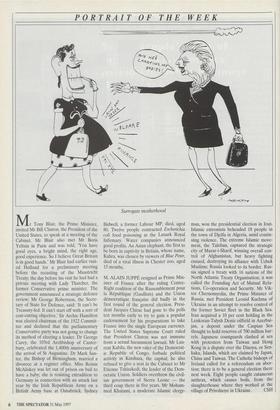PORTRAIT OF THE WEEK
Surrogate motherhood Mr Tony Blair, the Prime Minister, invited Mr Bill Clinton, the President of the United States, to speak at a meeting of the Cabinet. Mr Blair also met Mr Boris Yeltsin in Paris and was told, 'You have good eyes, a bright mind, the right age, good experience. So I believe Great Britain is in good hands.' Mr Blair had earlier visit- ed Holland for a preliminary meeting before the recasting of the Maastricht Treaty; the day before his visit he had had a private meeting with Lady Thatcher, the former Conservative prime minister. The government announced a strategic defence review; Mr George Robertson, the Secre- tary of State for Defence, said: 'It can't be Treasury-led. It can't start off with a sort of cost-cutting objective.' Sir Archie Hamilton was elected chairman of the 1922 Commit- tee and declared that the parliamentary Conservative party was not going to change its method of electing a leader. Dr George Carey, the 103rd Archbishop of Canter- bury, celebrated the 1,400th anniversary of the arrival of St Augustine. Dr Mark San- ter, the Bishop of Birmingham, married a divorcee at a register office. Miss Roisin McAliskey was let out of prison on bail to have a baby; she is resisting extradition to Germany in connection with an attack last year by the Irish Republican Army on a British Army base at Osnabriick. Sydney Bidwell, a former Labour MP, died, aged 80. Twelve people contracted Escherichia coil food poisoning at the Lanark Royal Infirmary. Water companies announced good profits. An Asian elephant, the first to be born in captivity in Britain, whose name, Kahra, was chosen by viewers of Blue Peter, died of a viral illness in Chester zoo, aged 15 months.
M. ALAIN JUPPE resigned as Prime Min- ister of France after the ruling Centre- Right coalition of the Rassemblement pour la Republique (Gaullists) and the Union democratique francaise did badly in the first round of the general election. Presi- dent Jacques Chirac had gone to the polls ten months early to try to gain a popular endorsement for his preparations to take France into the single European currency. The United States Supreme Court ruled that President Clinton was not immune from a sexual harassment lawsuit. Mr Lau- rent Kabila, the new ruler of the Democrat- ic Republic of Congo, forbade political activity in Kinshasa, the capital; he also refused to give a seat in the Cabinet to Mr Etienne Tshisekedi, the leader of the Dem- ocratic Union. Soldiers overthrew the civil- ian government of Sierra Leone — the third coup there in five years. Mr Moham- med Khatami, a moderate Islamic clergy- man, won the presidential election in Iran. Islamic extremists beheaded 18 people in the town of Djelfa in Algeria, amid contin- uing violence. The extreme Islamic move- ment, the Taleban, captured the strategic city of Mazar-i-Sharif, winning overall con- trol of Afghanistan, but heavy fighting ensued, destroying its alliance with Uzbek Muslims; Russia looked to its border. Rus- sia signed a treaty with 16 nations of the North Atlantic Treaty Organisation; it was called the Founding Act of Mutual Rela- tions, Co-operation and Security. Mr Vik- tor Chernomyrdin, the Prime Minister of Russia, met President Leonid Kuchma of Ukraine in an attempt to resolve control of the former Soviet fleet in the Black Sea. Iran acquired a 10 per cent holding in the Lenkoran-Talysh Deniz oilfield in Azerbai- jan, a deposit under the Caspian Sea thought to hold reserves of 700 million bar- rels. Japanese coastguards clashed at sea with protesters from Taiwan and Hong Kong in a dispute over the Diaoyu, or Sen- kaku, Islands, which are claimed by Japan, China and Taiwan. The Catholic bishops of Ireland called for a referendum on abor- tion; there is to be a general election there next week. Eight people caught cutaneous anthrax, which causes boils, from the slaughterhouse where they worked at the village of Privolnoye in Ukraine. CSH


































































 Previous page
Previous page